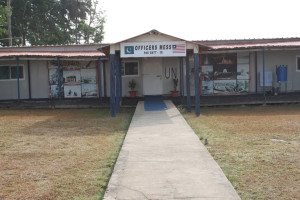Driving through the lush forest teeming with life, you’d never suspect that a war had raged in this land just nine years ago. These very rubber trees were slaughter tapped to fund it. Slash, more money for the warlords. Slash, more innocents maimed and killed. Slash, more decades until Liberia achieves some semblance of normalcy.

For normal is not a word I would use to describe this part of the world. With a population of just 3.5 million, these people should be rolling in money from iron ore, diamonds, oil, and latex from rubber trees. Throw a banana peel on the ground here and a tree will grow, a friend once told me.
Yet, they have nothing.
But these people are so joyful, I thought. Given all the devastation and destruction, they must be more repressed than my stoic part of the world.
It was an eight-hour drive to Voinjama, a town on the border of Liberia and Guinea. Four hours on dirt roads that I’m told were vastly improved from a few years ago, but the ruts of which simulated an intense abdominal workout that would have the Biggest Loser contestants begging for Jillian Michael’s return.
The security concerns are fierce for anyone in Liberia, including Liberians, and are especially so for foreigners. I’m not one to quickly buy into fear campaigns, but I know when I need to be vigilant. My face relaxed as we drove into PAK BATT, the United Nations peacekeeping mission.
As we drove through the gate, there was an explosion. It must be gunfire, I thought, my internal dialogue incredulous that I wasn’t more concerned. C’est la vie, I would soon be in the cozy cocoon of a military base. Give me a cup of tea and I’d be ready for anything.
But it was just thunder. A relief for more than one reason: This part of the earth hadn’t felt rain for five months. As it fell, the most solicitous of men brought me a cup of tea, as though he’d known what I was hoping. And I was at peace.
So, there I was: me, my two male colleagues still waiting in the car, and 400 Pakistani men.
After a time, the accommodations officer of the base came to greet me and ask how he could be of assistance. In short order, he had arranged a VIP room for me, and two rooms for my male colleagues. My room was spacious, a private paradise in this war-torn landscape. The water didn’t work when I arrived, but they had delivered a fruit plate and a bottle of water. There was an electric mosquito zapper to ward away the malaria. And a DVD player for my yoga workout the next day. Perfection.
Our hosts gave new meaning to the term “militant hospitality,” which I affectionately reserve for Armenians. Cynics will believe it’s because I was the only woman in sight, but my male colleagues will attest that they received the same warm welcome.
It was a strange delight to be in a version of Pakistan while in Liberia. Soccer games played constantly on the television in the mess hall as the officers and visitors dined on the buffet of Pakistani food. Meticulous about protocol, the row of officers across the large table was a curious sight in a part of the world ravaged by disorder.
Or maybe, I wondered over my offensively delicious chana masala, maybe the whole world is ravaged by chaos and willful lack of empathy. Maybe it’s peoples like the Liberians who are violently forced to accept the facts, while the rest of us live blissfully ignorant, protected by our own false sense of security.
Liberians are supposed to be grateful for anything. For example, the mining industry that brings them jobs and revenue. What’s overlooked is how pretty girls in mining communities are raised to be prostitutes. For $5, a John can have any manner of unprotected sex with young women from families who have no other choices. The country has a law that if an employee of a mining company impregnates a girl, the company is financially responsible. But I can’t fathom how they could enforce such a policy, no matter how well intentioned.
I’m truly naive. I actually believe that the world should not be run by bullies whose interests are always front and center. Drag me through the shit that life can be, and I’ll still feel the same way. On the flight out of Monrovia, I was seated next to a classy man from Ivory Coast, who has lived in London for the past 20 years. For the hour-long flight to Abidjan, we bemoaned the reality of the world.
“It’s just so disappointing,” I said.
“Yes, it is,” he responded.
“It’s just so terrible and wrong,” I continued.
“Yes,” he said.
“It just makes you wonder if we’re all lying to ourselves about everything,” I said with increasing desperation.
“Yes,” he said, nodding empathetically.
I felt better, somehow. He agreed that everything is a disaster, but we were both still upright. We both still believed that harmony was the answer, even if we didn’t have the solution.
We found no answers on that flight. I only know that he’ll be spending more time in his homeland once he retires, producing palm oil and renting out a few properties. And I’ll still be trying to make sense of what cannot be understood. When the plane landed, we shook hands emotionally in the aisle, like two people who wonder if they’ll ever meet again. Two people who, for a moment in time, understood nothing, together.


Be the first to comment